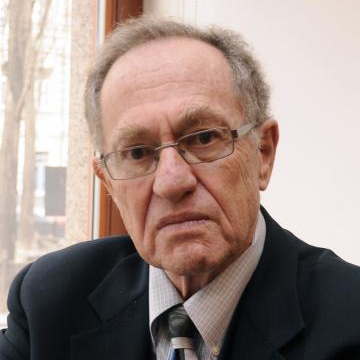Renowned attorney Alan Dershowitz to talk
constitutional law with SMU’s Lackland Bloom
Alan M. Dershowitz is widely regarded as one of the world’s most successful criminal defense lawyers, will speak at SMU on April 28.
DALLAS (SMU) – Alan M. Dershowitz is widely regarded as one of the world’s most successful criminal defense lawyers, having won 13 out of 15 high-profile murder cases in inimitable and provocative style. But Dershowitz also is one of the foremost experts in U.S. constitutional law, and will join SMU Dedman School of Law Professor Lackland H. Bloom, Jr., in late April for a public conversation about their shared legal passion.
 Alan M. Dershowitz |
“A Dialogue on Constitutional Law and Interpretation,” a Roy R. Ray Endowed Lecture, moderated by SMU Associate Provost and Dedman Law Associate Professor Linda Eads, will be from 6-7:30 p.m. Monday, April 28, at the Belo Mansion. The program will include a book signing for Dershowitz’s new autobiography, Taking the Stand, My Life in Law (Crown) and Bloom’s new book, Do Great Cases Make Bad Law? (Oxford University Press).
Tickets, $25 for the general public, are available by registering online. Admission will be free for SMU faculty/staff/students with ID; advance registration is required. For more details, contact Rebekah Bell at rbell@smu.edu or 214-768-4177.
“The list of legal issues and controversies that bear Dershowitz’s thumbprints is breathtaking,” The New York Times Book Review noted about his new autobiography. “That [this] one man involved himself in the Pentagon Papers case, the Clinton-Lewinsky scandal, Kennedy’s Chappaquiddick investigation, Sharansky’s release from a Soviet prison, the O.J. trial, Bush v. Gore, the Mike Tyson rape case, the Woody Allen-Mia Farrow custody dispute, the Julian Assange WikiLeaks investigation and the public debate over Trayvon Martin, reflects not just the breadth of Dershowitz’s experience but also its depth and duration,” said reviewer Dahlia Lithwick. “Love him or hate him,” Dershowitz has lived a life that matters, hugely and enduringly.”
Dershowitz, a Harvard Law professor emeritus, and Bloom, SMU’s respected constitutional law scholar, will consider how campaign finance regulation will affect freedom of speech after the recent U.S. Supreme Court decisions on Citizens United v. Federal Election Commission and McCutcheon v. Federal Election Commission.
They will analyze the pending Supreme Court decision on Sebelius v. Hobby Lobby Stores, Inc., on whether a corporation may assert its rights under the Religious Freedom Restoration Act or the First Amendment’s Free Exercise Clause. They also will discuss how hate speech regulation may impact freedom of expression, and how efforts to silence speakers on controversial issues threatens freedom of speech.
Dershowitz is a regular commentator on constitutional and civil liberties as well as the Arab–Israeli conflict. He recently retired after a nearly five-decade career at Harvard Law School, which he joined in 1964 at age 25. Three years later he was given tenure, making him the youngest full professor in the history of the university.
He is author of a number of best-selling books about politics and law, including Reversal of Fortune: Inside the von Bülow Case (1985), the basis of a 1990 film; Chutzpah (1991); Reasonable Doubts: The Criminal Justice System and the O.J. Simpson Case (1996); The Case for Israel (2003); Rights From Wrongs: A Secular Theory of the Origins of Rights (2004); and The Case for Peace (2005). Dershowitz also has written two novels.
 Lackland Bloom |
“We will address proper approaches to constitutional interpretation, including the appropriate role of textualism, original understanding and precedent,” says Bloom, who has taught constitutional law and copyright law at SMU Dedman School of Law for more than 30 years. “We also will consider to what extent it’s proper to view the Constitution as a living or evolving document — and, if so, how to prevent judges from simply imposing their own personal values,” he says.
Bloom’s newly published Do Great Cases Make Bad Law? details the history and academic scholarship surrounding the Supreme Court’s greatest cases, from Marbury v. Madison in 1803, to National Federation of Independent Business v. Sebelius (Patient Protection and Affordable Care Act case) in 2012.
He also is the author of Methods of Interpretation: How the Supreme Court Reads the Constitution (2009) and numerous constitutional law articles.